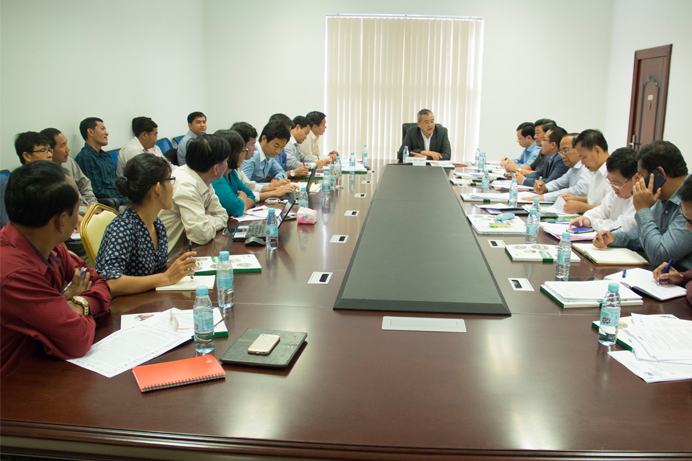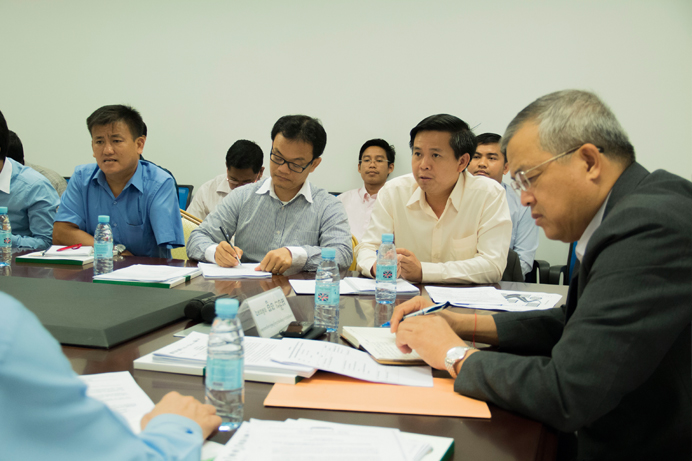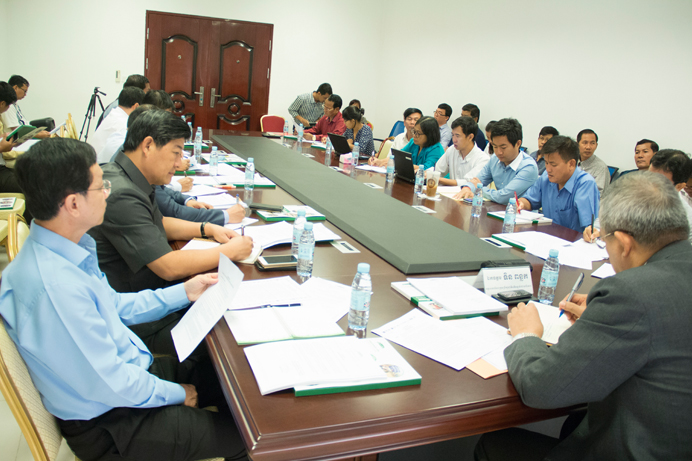
On the 6th of April 2017, the NGO Forum on Cambodia (NGOF) facilitated a meeting between CSOs and the Ministry of Environment (MoE). The meeting had four primary themes: 1) The Natural Resources and Environment Code (EC), 2) Climate Change Technical Working Group, 3) Effective Contribution of CSOs on Environmental Impact Assessment (EIA), and 4) Update on the Conservation Forum with the Prime Minister.
There were 33 participants from CSO working groups on the Natural Resources and Environment Code, CSO working groups on EIA, the NGOs Environment and Climate Change Alliance (NECA), CSO members, development partners as well as concerned officials from MoE.

During this meeting, Dr. Tek Vannara, the executive director of NGOF, reported: “So far we at the NGO Forum on Cambodia have facilitated 8 networks and 5 national working groups (450 LNGO/INGO), where focus on different issues include environment, natural resources, hydropower, agriculture, climate change, sustainable cities and green economy, biodiversity conservation, waste management, food safety and security, water governance, national development strategy, sustainable development and budgeting. For instance, today we have coordinated CSO working groups on the Natural Resources and Environment Code, CSO working groups on EIA and the NGOs Environment and Climate Change Alliance (NECA). As the membership organization, the NGO Forum on Cambodia will take the lead and play an important role in the coordination of NGOs and CSOs in order to provide and gather inputs and recommendations on the development of the Environment Code, EIA, and so forth.”
H.E. Tin Ponlok, Secretary General at the General Secretariat of the National Council for Sustainable Development and representative of H.E Say Sam Al, Minster of MoE, welcomed all participants to the meeting. Through him echoed the leadership of the Royal Government of Cambodia as well as MoE, as he stressed the aim to develop and further the conservation forum between government institutions and CSOs in order to strengthen cooperation and inputs provided by civil society for supporting reforms in the field of natural resource management and the environment. He has thus recognized the important role of CSOs. This is a great contribution from NGOs/CSOs in terms of supporting policy development and/or reform in Cambodia.
The main results of the discussions were: 1) continuing good and beneficial cooperation between the Ministry of Environment/the National Council for Sustainable Development and civil society organizations by developing a Memorandum of Understanding (MoU), 2) MoE is considering the key concerns of civil society on the Natural Resources and Environment Code and the EIA report, 3) higher quality of professional inputs and comments as well as collaborations, and 4) collaborations should have a long term vision and be up to date.
In terms of NGOF’s mandate – particularly in relation to the climate change strategic plan – concerns, policies and/or strategies on environment and climate change are central. We have been working with very sensitive issues such as EIA, the Natural Resources and Environment Code, etc. NGOF functions as the coordinator to collect inputs from other NGOs/CSOs, academia, lawyers, and local communities for the improvement of advocated issues. According to NECA and management team meetings, we found that there are some challenges that need to be clarified by MoE, especially the transparency of road maps.
The development of the Natural Resources and Environment Code is part of a broader reform agenda for sustainable development and green growth. The EC will include the following key aspects: environmental protection, biodiversity conservation, protection and management of cultural heritage, and environmental assessment. Provisions for issues such as climate change, urban environmental issues, sustainable cities, Strategic Environmental Assessment, grievance mechanisms, enforcement matters, public participation, etc., will also be included in the Code. The Code will establish a chapter of inter-ministerial cooperation among the numerous government institutions that currently share responsibility for environmental matters. The jurisdictional organization will then examine the roles, duties and means of collaboration among relevant institutions.
Since the start and development of the EC, selected CSO members have been involved and prioritized. However, CSO representatives in the seven sub-technical working groups (STWGs) have been inadequately represented in terms of numbers, inputs/recommendations and discussions due to their limited technical capacity and participation.
To deal with this challenge, the NGO Forum on Cambodia, Oxfam in Cambodia, and Development and Partnership in Action coordinated an ad hoc meeting on the 17th of June 2016 in order to: 1) inform NGO partners on the situation and progress of the Environment and Natural Resources Code; 2) discuss and develop a proactive NGO coordination framework for influencing this code; and 3) discuss and develop influence and communication strategies for NGOs, which are rooted in key international principles, approaches and strategies.
